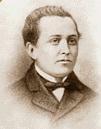Quebec 1837-1839
The Patriotes Rebellion
Source: L.-O. David, Les Patriotes, Éditions Lemeac, Montreal 1978 (original edition 1884);
Translated: for marxists.org by Mitch Abidor.
Marie-Thomas Chevalier de Lorimier was born in 1805, scion of a noble family that remained in Canada after the French defeat. A militant Patriot, he participated in all of the struggles of that party against the English authorities, from the fights with the pro-English Doric Club during the electoral season of 1832, to the armed struggle of 1837, where he was a participant in the battle of St Eustache. A leader of the abortive 1838 uprising of the Fréres Chasseurs he was captured when, thinking he was in the US, he wandered across the Canadian border. Considered one of the most dangerous of Canadians, he was sentenced to death and hung on February 15, 1839. He wrote the following political testament the night before his execution.

The public, and in particular my friends, are perhaps waiting for a sincere declaration of my sentiments. At the fatal hour which must separate us from the earth, opinions are always looked upon and accepted with more impartiality. At this moment, the Christian man strips himself of the veil that obscured many of his actions in order to allow himself to be seen in broad daylight. Interests and passion expire with his soul. As for myself, on the eve on giving up my soul to its creator I would like to make known what I feel and what I think.
I wouldn’t take this step if I didn’t fear that my sentiments would be represented under a false light. It’s known that the dead no longer can speak, but the same raison d'état that has me expiate my political conduct on the gallows could quite well fabricate stories about me. I have the time and the desire to prevent such fabrications, and I am doing it in a true and solemn fashion, at my final hour, not on the gallows surrounded by a stupid crowd with an insatiable thirst for blood, but in the silence and reflection of my cell. I die without regret. I wanted nothing but the good of my country in insurrection and independence.
My views and my actions were sincere, and weren’t stained with any of the crimes that dishonor humanity and are only too common in the effervescence of unleashed passions. Since I was 17 or 18 I have taken part in all popular measures, and always with conviction and sincerity. My efforts were for the independence of my compatriots. We have been unhappy until this day. Death has already decimated many of my collaborators. Many moan in chains, a greater number are in exile, their property destroyed and their families abandoned to the rigors of the Canadian winter. Despite so much misfortune my heart still maintains its courage and its hopes for the future. My friends and my children will see better days; they will be free. A certain premonition, my tranquil conscience assure me of this. This is what fills me with joy when all is desolation and pain around me. My country’s wounds will heal.
After the unhappiness of a bloody revolution, the peaceful Canadian will see happiness and freedom reborn on the Saint Lawrence. Everything works together for this goal, even the executions. The blood and the tears shed on freedom’s altar are today watering the roots of the tree which will hold the flag bearing the two stars of Canada. I leave behind children whose only inheritance is the memory of my misfortune. Poor orphans; you are the ones for whom I feel sorry. It is you who the bloody and arbitrary hand of martial law strike with my death. You will not have known the sweetness and the advantages of embracing your father on happy occasions, on holidays. When your reason will allow you to reflect, you will see your father, who expiated on the gallows actions which made other, happier men immortal. Your father’s only crime was his lack of success. If success would have crowned his efforts, his actions would have been honored with a respectable mention. “Crime causes shame, not the scaffold.” Men of a greater merit than mine have already cleared the path which remains for me to follow from the dark prison to the noose. Poor children! You will only have a tender and distressed mother for support, and if my death and my sacrifice reduce you to poverty, ask for help in my name; I wasn’t insensible to the calamities of ill-fortune.
As for my compatriots! If only my death and those of my companions at the gallows could be useful to you, if only they could show you what you can expect from the English government. I only have a few hours to live, but I wanted to share this precious time between my religious obligations and those due to my compatriots. For them I die on the gallows the infamous death of a murderer; for them I am being separated from my young children, my spouse, with no other support; and for them I die in crying out: “Long live freedom! Long live independence!”